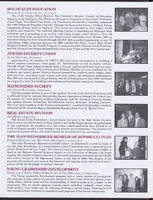Search the Special Collections and Archives Portal
Search Results

Isaac Barrón oral history interview: transcript
Date
Archival Collection
Description
Oral history interview with Isaac Barrón conducted by Maribel Estrada Calderón and Claytee D. White on March 27, 2019 for the Latinx Voices of Southern Nevada Oral History Project. Isaac Barrón was born and raised in Las Vegas, Nevada. His father entered the United States as a Bracero. Barrón attended Rancho High School and earned his bachelor's degree in secondary education from UNLV. He currently teaches history at Rancho High School and serves as North Las Vegas' Councilman. In this oral history, Barrón recalls his youth in North Las Vegas, navigating the presence of gangs, and his path to being a community activist and advocate for North Las Vegas youth. He has led volunteer efforts for community improvement projects, including the plans for a new public library. He holds the distinction of being the first Latinx member of the North Las Vegas City Council and Southern Nevada's first Hispanic Mayor Pro Tempore. In 2013, he was elected to represent Ward 1 and was reelected for a second term in April 2017. He discusses being Mexican American, the Coalition of Pan American Organizations, the Hispanic Student Union, the Bracero Program, and Rancho High School.
Text

José Luis Meléndrez oral history interview: transcript
Date
Archival Collection
Description
Oral history interview with José Luis Meléndrez conducted by Laurents Bañuelos-Benitez on November 20, 2018 for the Latinx Voices of Southern Nevada Oral History Project. In this interview, Meléndrez discusses his family background and early life in Baja California. He talks about his father's decision to migrate to the United States, and attending Catholic schools in California, Nevada, and Texas as the family moved around the country. Meléndrez recalls moving to Las Vegas, Nevada in 1990, enrolling at the University of Nevada, Las Vegas (UNLV), and his involvement with the Boy Scouts of America affiliated program, Learning for Life. Later, Meléndrez describes attending the University of Michigan, earning a master's degree in social work, and becoming executive director for the office of Community Partnerships in the UNLV School of Public Health. Lastly, Meléndrez discusses the future of the Las Vegas Latinx community, and becoming a founding member and chair for the Nevada Minority Health and Equity Coalition.
Text

Anthony Kappenman oral history interview: transcript
Date
Archival Collection
Description
Oral history interview with Anthony Kappenman conducted by Claytee D. White on May 16, 2019 for the Remembering 1 October Oral History Project. Kappenman begins the interview by talking about his early life, childhood, work, and his time in the military. Afterwards, he recalls what he did on October 1, 2017 prior to the Route 91 festival and during the shooting. He describes his journey trying to escape the area, arriving at the airport injured, and his stay in the hospital. Then, Kappenman talks about how he felt about the way the city and first responders had responded during the shooting, and how the community united afterwards. Lastly, he talks about his opinions on gun control, his recovery, and how he felt after the shooting.
Text

Carole Fisher oral history interview: transcript
Date
Archival Collection
Description
Oral history interview with Carole Fisher conducted by Barbara Tabach on December 14, 2016 for the Southern Nevada Jewish Heritage Project. In this interview, Fisher discusses her family background and moving to Las Vegas, Nevada in 1979. Fisher talks about Nathan Adelson Hospice, programs that they provide for the Las Vegas senior community, and the increase of hospices in Las Vegas. She describes how Nathan Adelson Hospice is able to provide care for uninsured people, fundraising events they organize, and how their hospice differs from traditional hospital care. Lastly, Fisher discusses the significance of death in the Jewish religion.
Text

Amber Diskin oral history interview: transcript
Date
Archival Collection
Description
Oral history interview with Amber Diskin conducted by Barbara Tabach on January 5, 2018 for the Remembering 1 October Oral History Project. In this interview, Amber Diskin discusses her experience at the Route 91 Harvest music festival during the October 1, 2017 mass shooting in Las Vegas, Nevada. Diskin talks about finding her way home after escaping the crowds and letting her family and friends know she was not hurt. She speaks of the aftermath of the shooting, including how her children were affected, the post-traumatic stress disorder she developed, and how the shooting has affected her love of concerts. As a native Nevadan, she shares her views of Las Vegas and how her sense of community deepened after this event. Diskin ends the interview by discussing her appreciation for the first responders and the gift baskets she helped distribute to hospitals, police stations, and the fire department.
Text

Emilia Marquez oral history interview: transcript
Date
Archival Collection
Description
Oral history interview with Emilia Marquez conducted by Maribel Estrada Calderón on July 5, 2019 for the Latinx Voices of Southern Nevada Oral History Project. Claytee D. White and Emily Lucile are also present during the interview. Emilia Marquez was born in the United Stated and raised in Alexandria, Virginia, where her father worked as a bricklayer, until the age of twelve, when her father decided to move the family back to Uruguay. She describes acclimating to her new life in middle school and her shift from being perceived as an outsider in Uruguay to accepting Uruguay as home. She describes life in Uruguay and the positions that her family held while living there. After meeting and marrying her husband they trained to work in a casino. She trained as a slot machine operator, and her husband trained as a dealer. This eventually led them to leave Uruguay for the U.S. After the encouragement of her father and mother, she moved with her mother to Las Vegas to work in the casino industry. She describes working as a change person at the Luxor before moving to the newly opened Palms, where she worked until she left it to work at the Wynn. She ends the interview talking about various Uruguayan dishes and traditions, and a brief history of Uruguay. Subjects discussed in this interview: Uruguay, immigration, Las Vegas Strip, Latinx, Luxor.
Text

Gabriel Garcia oral history interview: transcript
Date
Archival Collection
Description
Oral history interview with Gabriel Garcia conducted by Monserrath Hernandez and Barbara Tabach on November 13, 2019 for the Latinx Voices of Southern Nevada Oral History Project. In this interview, Garcia discusses his early life in Arizona and moving to Las Vegas, Nevada in 1984. He remembers attending a sixth grade center, the Pacific Engineering and Production Company of Nevada (PEPCON) explosion, and attending Las Vegas High School. Garcia talks about Mexican culture in Las Vegas, car clubs, and becoming a graphic designer. Lastly, Garcia discusses his involvement with the Association of Latino Professionals for America, and the idea of diversifying the professional workplace.
Text

Ashok Mirchandani oral history interview: transcript
Date
Archival Collection
Description
Oral history interview with Ashok Mirchandani conducted by Kristel Peralta, Cecilia Winchell, and Stefani Evans on March 11, 2021 for the Reflections: The Las Vegas Asian American and Pacific Islander Oral History Project. In this interview, Mirchandani discusses his early life in Kolkata, West Bengal, India and arriving to Las Vegas, Nevada in 2002. He talks about Indian traditions he celebrates and Indian festivals in the United States. Mirchandani recalls his employment with the State of Nevada, becoming the Director of the Department of Business and Industry, and advocating for small businesses. Later, Mirchandani describes the importance of minorities in politics, engaging in policy making, and the need for Asian Americans in public services. Lastly, Mirchandani discusses the model minority myth, developing the Nevada Home Retention Program, and emphasizes children's mental health.
Text

Congregation Ner Tamid roundtable oral history interview: transcript
Date
Archival Collection
Description
Oral history interview with the Congregation Ner Tamid roundtable conducted by Barbara Tabach on September 21, 2016 for the Southern Nevada Jewish Heritage Project. In this interview, Rabbi Sanford Akselrad and five members of the congregation discuss the founding of Congregation Ner Tamid, the first reform synagogue in Las Vegas, Nevada, in 1974. They go into detail on how the synagogue was formed, the building-hopping they did until they built their current structure, and the funding it took to get to that point. The interviewees reveal a few donors, such as Morris Dalitz and Frank Sinatra, who helped to build their synagogue and school. The interview ends with meaningful stories and memories the members have relating to Congregation Ner Tamid.
Text

